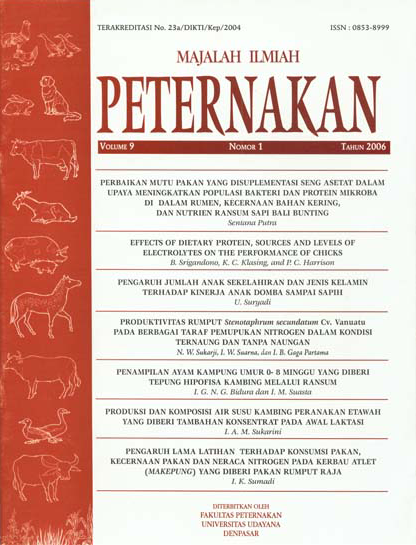THE EFFECT OF MOLASSES SUPPLEMENTATION ON RUMEN FERMENTATION, MICROBIAL PROTEIN SYNTHESIS AND NITROGEN RETENTION IN SHEEP KEPT UNDER HIGH AMBIENT TEMPERATURE AND FED UREA-TREATED BARLEY STRAW
Abstract
SUMMARY This experiment was designed to examine the possibility that soluble carbohydrate was deficient in barley straw given to the sheep. A different level of molasses in the dry matter (DM) of urea-treated barley straw was fed to lambs at 40?b3 0C and at 40-50% relative humidity for a 7 week period. Sixteen Merino sheep were fed a basal diet of urea treated chaffed barley straw with one of 4 level of molasses supplements: (1) 0% (control), (2) 6%, (3) 12%, and (4) 18%. All diets were supplemented with minerals and vitamins. Feed was offered at 09.00 and 16.00 h daily and drinking water was available ad libitum. The parameters recorded were rumen ammonia nitrogen (N) concentration, rumen pH, rumen volatile fatty acid (VFA) concentration, microbial protein synthesis (MPS) and nitrogen content in the feed, faeces and urine. There was no significant effect of molasses on rumen ammonia concentration (P>0.05). The means of ammonia N concentration were 125?b6.1 and 192?b5.8 mg NH3-N/L before and 2 h after feeding. Rumen pH was also not affected by treatment (P>0.05) and averaged 6.7?b0.04. Total VFA concentration and butyric acids as a percentage of total VFA in the rumen fluid increased progressively with increasing the levels of molasses in the diet. The lowest levels, 53.1?b2.1 mmol/L and 6.1?b0.21% were recorded in the controls and the highest levels (70.9?b2.89 mmol/L and 10.9?b0.2%, respectively) in the diet with 12 and18% of molasses. In contrast, as the molasses level increased in the diet, the proportion of acetic acid declined from 75.0?b0.6 to 71.1?b1.1%. The proportion of propionic acid (16.1?b0.29%) was not affected by level of molasses (P>0.05). An increase in MPS from the rumen was recorded as the molasses level increased (P<0.05), from 3.4?b0.35 g N/d in controls to 4.6?b0.07 g N/d at 18% molasses. All sheep had positive N retention, but the level of molasses did not affect N intake, total N excretion (faecal and urinary) as well as N retention (P>0.05; means of 8.6?b0.21, 3.3?b0.09, 3.7?b0.08, 1.6?b0.2 g/d, respectively).Downloads
Download data is not yet available.
Published
2012-09-02
How to Cite
MARSETYO, MARSETYO; NOLAN, J.V.; THWAITES, C.J..
THE EFFECT OF MOLASSES SUPPLEMENTATION ON RUMEN FERMENTATION, MICROBIAL PROTEIN SYNTHESIS AND NITROGEN RETENTION IN SHEEP KEPT UNDER HIGH AMBIENT TEMPERATURE AND FED UREA-TREATED BARLEY STRAW.
Majalah Ilmiah Peternakan, [S.l.], v. 8, n. 3, sep. 2012.
ISSN 2656-8373.
Available at: <https://ojs.unud.ac.id/index.php/mip/article/view/1694>. Date accessed: 25 feb. 2026.
Issue
Section
Articles






